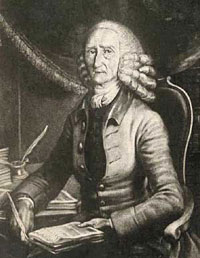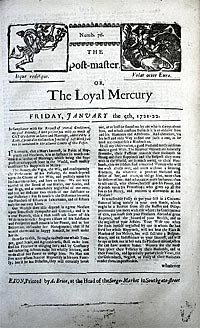
Andrew Brice - newspaper man and rebel
Page updated 28 February 2011
Return to Exeter People Menu
Andrew Brice was Exeter's first newspaper man of
real significance; the son of a shoemaker, possibly born in Butchers
Row in either 1690 or 1692, he claimed his father wanted
him to become a minister, having a grammatical
education in preparation, but he was in the event, too poor to
fund him. The first
Exeter newspaper, the Exeter Post-man appeared arguably in 1704 or more likely 1707. Within a short time
other newspapers had
appeared including Joseph Bliss's Exeter
Post-Boy to which Brice was a printer's apprentice from the
age
of 17, but he 'roguishly absconded
and deserted from my
Service' in 1715, and hence, he was never made a freeman of the
city.
His first newspaper
Two years later he established his own newspaper, The Exeter Postmaster or the Loyal Mercury at the head of the Serge Market in Southgate-street. This was the first of a long series of titles published in Exeter including Brice's Weekly journal, from 1725, which are often referred to as Brice's Old Exeter Journal although the latter first appeared in 1746.
Like the 19th Century Thomas Latimer, Brice was outspoken,
often getting into trouble for something he had published. Along with
other newspaper editors, he was required to appear before Parliament
for publishing their proceedings in 1718. He claimed he had merely
passed on the contents of newsletters that were freely available at the
coffee-houses of Exeter. Brice also like Latimer, was a crusader for
the common folk of the city, including campaigning in 1727, for those
who were thrown into the debtors prison at St Thomas, for which in 1730
he was fined for libel on the gaoler and, was himself, confined to his
house for eight months for non-payment, spending his time writing a
poem called Freedom. In addition, his mother and his wife died before
he finally paid £103 for his freedom.
The Earthquake
In July of the same year, Brice wrote of the earthquake or violent concussion of the Earth that hit Exeter. His description leaves nothing to the imagination "when of a sudden my Bed was forcibly agitated and shaken, as I may compare it, as a Bolting-Sieve or Searce is shov'd to and fro to sift your Flour , accompanied with a russling Noise, and Clashing of the Window. Which amazing mighty Shock continued, I believe, above Half a Minute, without Intermission."
He was a keen supporter of the early theatre in
Exeter. When the Exeter players were persecuted during 1745, he
published a poem defending them and attacking the Methodists, whom he
named 'The Play-house Church',
or 'New Actors of Devotion.'
He also wrote prologues to plays which he often delivered himself, on
the stage of the Seven Stars Inn.
By 1743, Andrew Brice, and his wife Sarah, were based at the sign of "The Printing Press" in Gandy Street. Not only did Brice work as a newspaper editor, but he devoted many years to his Grand Gazeteer or Topographic Dictionary, a work of 1500 pages issued in 44 monthly parts in the years 1751 to 1755, and later in 1759 as a collected work. He covered a wide range of issues and wrote of the influence of education and "charity-school establishment whereby a hundred can read, write and cypher, now at this time, to ten that could barely read 50 or 60 years ago."
The Mobiad
The Mobiad, or Battle of the Voice an Heroi-Comic Poem, Being a Description of an Exeter Election, written in 1738, was a satirical look at the mayoral elections of 1737 - publishing such a Hogarthian satire was dangerous at the time, which probably accounts for the delay in publication, until 1770. The work describes many places in the city including Castle Lane which he compares with Drury Lane in London or Damnation Alley in Plymouth. He also writes of Stepcote Hill "A descent called Stepcote-Hill, to which the Butcherow leads.... the Guts, Blood, Litter, Ordure and a variety of Nastiness are, in hard showers of rain, rapidly carried.... into the River".
His Bricism style of satire as it was called in 1781 used some creative language. Examples of his inventive vocabulary are : flim-sinewed, detorting, elboic, gloating, spuddling, plorant, spumiferous, vacive-noddle, cogitabundation, armipotence and scranch, all of which would keep an 18th century reader on his toes, never mind one from the 21st century.
In the Mobiad, Brice writes of his love for Exeter 'Born, bred, brought up, and having always dwelt, in the City, I have a natural inclination to love her, as my mother, and wish sincerely for her welfare ... During my poor remains of life I shall heartily wish a continuance of prosperity, and growing reputation, in all respects, to this my beloved Exeter - from which no endeavours have prevail'd to draw me away.'
Andrew Brice is dead
He went into partnership with Barnabas Thorn in 1769 allowing Brice to go into semi-retirement before his death on 7th November 1773 at the age of 83. At the time of his death he was the oldest master mason and oldest master printer in England. Thorn continued running the newspaper, followed by his son Richard, until Richard's death in 1787.
In his Grand Gazetteer, Andrew Brice wrote that the Apollo Room at the New Inn was the only Lodge of Exeter Freemasons and it was appropriate that this former Master of the Lodge be layed out in the Apollo Room. The public were charged 1 shilling each to pay their respects, said to be an amount to help defer the cost of his funeral, Brice having hit hard times in his last years. From the Apollo Room, the remains of this past Master of the Lodge were accompanied by 200 of the fraternity of the Lodge of Exeter Freemasons, judges and several hundred citizens, to Bartholomew's Yard for interment in a grave without a headstone, and of unknown position. This epitaph was recorded by the contemporary historian, Polwhele.
"Here lies Andrew Brice, the old Exeter printer
Whose life lengthen'd out to the depth of its winter,
Of his brethren masonic he took his last leave,
Inviting them all to a lodge at his grave :
Who, to shew their respect, and obedience, came hither
(Or rather the mob and the masons together )
Sung a hymn to his praise, in a funeral tone,
But disliking his lodging, return'd to their own."
This thorn in the side of the establishment was at last silenced, but his early influence upon journalism in Exeter would be continued by such as Robert Trewman and Thomas Latimer. The Old Exeter Journal was purchased in 1791 by The Flying Post's Robert Trewman, a former apprentice of Brice, with his son, Richard Trewman establishing the Flying Post on the side of reform, a position that would have been applauded by Andrew Brice.
Sources: Eighteenth Century Exeter by Robert Newton, Andrew Brice and the Early Exeter Newspaper Press by T N Brushfield 1885, Antiquarian Notes and Queries, Devon and Cornwall Notes and Queries, West Country Poets website, The Life and Bibliogrphy of Andrew Brice by T N Brushfield MD and the Devon Library Local Studies website.
 Andrew Brice.
Andrew Brice.
 Issue 76 for the 5th January 1722 of the Post Master, printed by Andrew
Brice. The article is about love and marriage. With the kind permission
of the Devon and Exeter Institution.
Issue 76 for the 5th January 1722 of the Post Master, printed by Andrew
Brice. The article is about love and marriage. With the kind permission
of the Devon and Exeter Institution.
│ Top of Page │